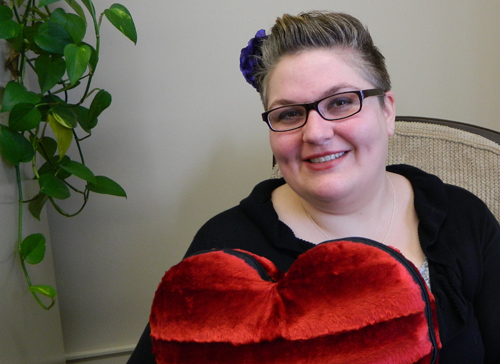
There’s some good news for women who are trying to leave relationships where they have been subjected to abuse or violence. They are often stereotyped as women who will be perennially attracted to abusers: once they get out of one bad relationship, they’ll go on to choose a new partner who will also abuse them.
Not true, says Prof. Ruth Neustifter, a new faculty member in the Department of Family Relations and Applied Nutrition.
She’s been studying survivors of intimate partner violence who move on to new, non-violent relationships, and she says there are plenty of them. “We have the perception that people are trapped in a cycle of violent relationships, but that’s not always the way it happens. Many people are able move on to new, positive situations,” she says.
What allows some to move forward while others repeatedly end up in violent relationships? “It seems to be recognizing or remembering an identity beyond that of the relationship,” says Neustifter.
“Often the person’s whole life starts to revolve around the potential for crisis and abuse, constantly walking on eggshells and trying not to get hurt. But if you can see who you are beyond that – even a small thing like ‘I am someone who is a good cook, or someone who loves going to funny movies with friends’ – it becomes possible to build on that and make the changes.”
She adds that this insight has to be combined with resources such as housing, health care and therapy that help the person find security outside the violent relationship.
Neustifter says she’s been pleased to share this research with police, social workers and others who work professionally with couples in crisis. “It is very valuable to them to know about this, because they rarely get to see the people who exit violent relationships successfully,” she says. “They may go to the same house over and over without seeing an improvement, but many of the people in my study said that it was something the police or a social worker said or did that planted the seed.”
Many of those in her research also mentioned finding new joy in sexual intimacy with their new partners – a nice link to Neustifter’s second area of research focus: sexual well-being for adults. In this field, she examines several areas: sex and disability or chronic illness, sex and those recovering from intimate partner violence, and the gender-queer and sex-queer spectrums.
“I bring information and resources to people who are sometimes thought of as not sexual, or as having bigger issues to worry about than sex.”
Neustifter approaches both research areas with a sense of humour. That’s why she has a smiling fabric uterus perched on top of her computer monitor. “I try to make sex information very accessible to the public,” she adds. “My goal is to provide high-quality information in a fun way.”
She blogs and has made hundreds of presentations to groups and workshops. For example, she’ll be at the International Family Therapy World Congress in Florida Feb. 20 to 23, talking about “Healthy Forms of Kinky and Open Relationships.” She says: “In the wake of Fifty Shades of Grey and the Twilight books, counsellors want to know how to have conversations with their clients about these topics and help them have healthy relationships.”
Neustifter was born in Wisconsin, grew up in Michigan, and did her undergrad studies in psychology in Syracuse, N.Y. She then completed a master’s degree in social work with a specialization in marriage and family therapy at the University of Louisville in Kentucky. Her PhD was completed at the University of Georgia in child and family development, along with a certificate in marriage and family therapy and a second certificate in interdisciplinary qualitative research.
Between her undergraduate and master’s degrees, Neustifter moved to Indianapolis and worked for AmeriCorps for two years. “I worked with high-risk public school students, trying to prevent gang enrollment. You know the needs in a community are severe when kids are being recruited for gangs in elementary school.”
After graduation she taught in Washington, D.C., and helped develop professional development materials for the American Association for Marriage and Family Therapy before coming to U of G.
“I am excited about the opportunities for collaborative research here,” she says. “The program has a great reputation, and I remember speaking at conferences here and being impressed by the quality of the event and the community.”
As well as teaching and continuing her research, Neustifter will be supervising students working in the Couple and Family Therapy Centre. And she’ll be doing a little more office decorating: “I have a lot of fun props still packed away.”